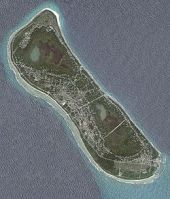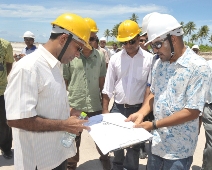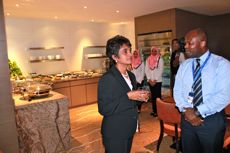While watching NATO-backed rebels rummaging through fallen dictator Gaddafi’s abandoned belongings, a middle-aged Dhivehi lady exclaimed at the television ‘How the West conspires against Muslim leaders!’
The seemingly misguided remark, upon second thought, deserves further analysis.
Gaddafi himself, after all, has claimed to be a leader of Muslims – defending the Islamic nation against the rebels, whom he has referred to as ‘rats’, ‘cockroaches’ and ‘unbelievers’.
He would also call upon ‘Sheikhs’ and ‘Scholars’ in and around Tripoli to rise up and defend the faith from the godless rebels.
Gaddafi is by no means the first politician to imagine himself as a “leader of the Muslims”. Over the decades, several people have laid claim to this mantle.
Hosni Mubarak, the Iranian political clergy, the Muslim Brotherhood in Egypt, the Islamist parties of Pakistan and Bangladesh and – closer to home – former President Maumoon Abdul Gayoom, the Adhaalath party, and various individual “Sheikhs” have all modeled themselves as ‘Islamic leaders’, portraying an image of Islamic piety, and shouldering the unwieldy burden of the speaking for the entire Islamic faith.
And yet, despite these innumerable ‘leaders’, all whom assert they have the ultimate solution to Islam’s woes, the 1.5 billion strong Muslim community has consistently had a poor report card in all areas of human development in recent decades.
Golden Age
A cursory look at history shows a dramatically different picture.
It was during Ramadan just over 1400 years ago that an illiterate Prophet was first commanded to ‘Read!’.
Within a few short centuries, Islam would end up as the dominant force in the world, commanding a wealthy Empire that would be celebrated as the fountainhead of all learning, discovery and innovation.
A religion revealed to a barbaric, medieval tribe would transform them overnight into champions of knowledge and achievement, resulting in “the Golden Age of Islam” that produced intellectuals and polymaths of the caliber of Ibn Sina, Al Farabi and Ibn Rushd.
So why is that, a thousand years later, despite the advancements in technology and communications, Muslims no longer revel in that spirit of achievement?
A reasonable argument could be made that that following the decline of the Muslims, a large majority of the Muslim lands had been colonized, followed by extended periods of dictatorial regimes threatened only recently by the Arab spring.
Yet, former colonized states like China, India and South Africa are making all making giant strides using the best of modern Science and Technology, but Muslims in general appear to not yet have found that fire.
Muslims are largely missing from advanced fields like scientific research and the global business world, or are very severely under represented – whereas tyrants and gun-toting militants throughout the Islamic heartland have somehow gotten labeled ‘Muslim leaders’.
Perhaps it is time now to acknowledge that the Islamic community is facing a severe leadership crisis?
The Curse of the Leaders
To evaluate the cause, let us first glance at a list of the individuals all of whom have in recent decades appointed themselves captains of the ship.
Osama bin Laden. Mullah Omar. Ayatollah Khameni. Al Qardawi. Ibn Baz. At home, we have such luminaries as “Sheikh” Ibrahim Fareed, “Sheikh” Iliyaas and a disproportionately large number of other such eminent scholars to guide our tiny population.
The grand roadmap these “leaders” have for Muslims can be measured by the broad canvas of issues they usually occupy themselves with.
While one group’s idea of salvation for humanity lies in forbidding women from buying cucumbers and other phallic vegetables of potential sin, another invests endless time, money and resources into efforts to threaten, intimidate or harass women into wearing black middle-eastern style veils.
Some declare life-saving vaccines as haraam, while others are entirely outraged over the 3 year old kindergarteners studying together in co-ed schools.
When they’re not burning books, they can be found condemning yoga. When they’re not busy uncovering Zionist organ-harvesting rackets, they’re dissecting the heavy legal issues surrounding the permitted length and colour of a woman’s hair.
Even celebrated Sufi poet Ghalib once pondered over the Ulema’s disturbing preoccupation with the problems of menstruation and menstrual bleeding.
In the year 2011, there is still some disagreement over whether girls should indeed be sent to school.
More than a couple of these wise mullahs have issued fatwas against Tom & Jerry on National TV, while another has outright called for Mickey Mouse to be put to death.
And almost all of them are united in their common jihad against established, peer-reviewed Science.
And herein lies the diagnosis for our woes; Muslims today are plagued with “leaders” that, instead of boldly taking them to the future, have pledged to stay frozen in time – or even worse, insist on running the civilization race in the opposite direction as the rest of humanity.
Entire generations have been lost thanks to myopic mullahs, and tyrants whose foresight does not extend beyond the tip of their nose.
A culture once credited with keeping alive the flame of knowledge through the centuries is now known more for dogmatism and hostility to Science.
Political tool
Perhaps the biggest tragedy of Islam is that it has ended up as a tool of political convenience.
Self-declared “leaders”, who have no achievements to speak of, cloak themselves in religious garb and invoke the name of God as their only claim to legitimacy.
In their hands, religion ceases to be a moral code for the community’s common welfare – and instead becomes a stick to keep the masses under control.
In the wake of the recent Arab democratic uprisings, the Saudi Arabian government promptly issued ‘Islamic rulings’ against protesting against authority. (The jarring irony of it, coming from the Wahhabi-Saudi nexus that once rose in revolt against no less than the Islamic Caliph!)
When it suits these tyrants, the rules are carved in stone, and when necessary, the Qur’an might as well have been written on water.
Dr. Amir Hussain, prominent Professor of Theological studies said in an interview with Science and Spirit magazine, that tyrants “find it useful to espouse the rhetoric of faith, because people respect that language, are reluctant to oppose it”
Two days before abolishing the Islamic Caliphate in early March 1924, Mustafa Kemal Pasha, founder of modern Turkey, told his assembly:
“The religion of Islam will be elevated if it will cease to be a political instrument, as had been the case in the past…”
The Pied Pipers
Some of the greatest achievements of the Islamic Golden age were the grand libraries and Universities of Baghdad and Cordoba.
The great polymaths of that era kept alive the knowledge of the Ancient Greeks and the Indians – reviving ancient philosophy, number systems, algebra, chemistry and astronomy.
In President Obama’s words, it was Islam that taught the world navigation of the Seas, and the mastery of pens.
Today, Muslims around the world fare poorly in Education. The 2006 Sachar Committee Report commissioned by the Indian Prime Minister revealed that 25 percent of Muslim children in India under the age of 15 didn’t attend schools, or dropped out early.
There are no great Islamic Universities today – and troublingly enough, it is the so-called ‘leaders of Muslims’ themselves who are actively engaged in a campaign against ‘evil, Western education’.
The establishment in 2009 of $10 billion King Abdullah University of Science and Technology would ideally have been hailed as a tremendous opportunity to revive learning and research in the Muslim heartland.
Instead, the ‘religious leaders’ in Saudi Arabia reacted with fury over the larger, more pressing issue of the University being a co-ed institute.
Orthodox Islam has always opposed what the rest of humanity considered progress
Professor Dr. Amir Hussain once said, “Knowledge is highly prized in Islam, but fundamentalist Muslim rulers have hounded Islamic scholars for centuries.” Great intellectuals like Ibn-Rushd thrived despite the pressures these anti-intellectual forces.
However, in recent years, modernism has all but disappeared from mainstream Islamic discourse, giving the anti-intellectuals a free run to propagate their views as ‘true Islam’.
Sir Syed Ahmed Khan was one of the modern Muslim pioneers who believed Islam would be greatly damaged if not shielded from the orthodox clergy.
Believing that a proper, Western-style scientific education was crucial for Muslims’ advancement, he founded the Muhammedan Ango-Oriental College in 1875 (It would later become the Aligarh Muslim University)
Former Pakistan Supreme Court Justice Javid Iqbal, son of celebrated Urdu poet-Philosopher Allama Iqbal, believes Islam’s revival is dependent on interpreting the religion in light of modern scientific thought which would ‘strengthen the faith of believers’.
Condemning the medievalisation of Pakistan, he recounted how his father had blamed conservative Mullahs for driving Muslims into the dark ages.
“My father’s advice was unequivocal: Muslims should not let themselves be exploited by the semi-literate Mullah… Mohammed Iqbal went out of his way to expose the intellectual bankruptcy of the Mullahs — the same Mullahs who have once again taken the lead in Islam”
Shirin Ebadi, the first Muslim woman to win the Nobel Prize, also calls for an interpretation of Islam that is in harmony with equality and democracy, claiming that it is not that religion that binds women, but “the selective dictates of those who wish them cloistered.”
To bell the cat
The prevailing school of thought in the Maldives and many countries around the world is that Islam does not permit dissent or free opinion.
The original draft of the Religious Unity Regulations drawn up by the Ministry of Islamic Affairs in the Maldives, for instance, forbade ordinary citizens from expressing a personal opinion on religion in any form. Furthermore, it also criminalized the most basic democratic right of criticizing authority, instantly putting self-declared ‘religious scholars’ above all public scrutiny.
This clampdown on free thought throughout the Islamic world is perhaps the reason why Muslims have become afraid to think, afraid to speak, and afraid to pull themselves out of the age of Ignorance, as their cultural forefathers boldly did so many centuries ago.
Perhaps one of the greatest wasted opportunities in modern times is the pulpits around the world in front of which hundreds of millions of Muslims congregate in prayer.
There are forums that could conceivably be used to inspire Muslims to work harder, to educate themselves, to educate their children, to promote Science and to promote culture.
Instead, most of us walk away every Friday having heard for the umpteenth time, tired reiterations on the importance of praying five times a day or fasting in the month of Ramadan, and armed with even more evidence of the continued treachery of Jews and Christians.
Change of guard
The Muslim needs leaders who can go beyond petty sloganeering and asserting a hollow supremacy.
For instance, leaders like former President of India, Dr. A.P.J. Abdul Kalam, the nuclear scientist known for his humility and passion for youth, transcended the boundaries of race and religion, and inspired a larger community of nation builders.
Leaders like Gandhi, Tagore and Mohamed Ali Jinnah – inspired by 19th-century British liberalism – come across as intellectuals hostile to the idea of discrimination itself.
Today, more than ever, Muslims need leaders of such fierce intellect and industry, if they’re to rub shoulders with the rest of the world as responsible equals, instead of wallowing in eternal self pity.
We need leaders who understand that for a religion to retain its greatness, its principles need to be as dynamic as the human cultures and societies themselves.
Our mullahs have shown us how exceedingly easy it is to wallow in the darkness and blame everything on the West and the Jews.
What we need is a change of guard, and a new class of leaders who are not afraid to take the much harder route – one of accomplishment and progress; to create a world where a tyrant like Gaddafi or terrorist like Osama never again gets mistaken for a ‘Muslim leader’.
All comment pieces are the sole view of the author and do not reflect the editorial policy of Minivan News. If you would like to write an opinion piece, please send proposals to [email protected]
Likes (2)Dislikes
(2)Dislikes (0)
(0)  “If the government wants us to let them hear the voice of the people again, we are ready to do it,” Shaheem said, calling on citizens of Fuvahmulah and the public to “raise your voices against this decision by the government.”
“If the government wants us to let them hear the voice of the people again, we are ready to do it,” Shaheem said, calling on citizens of Fuvahmulah and the public to “raise your voices against this decision by the government.” confidence that the construction of an airport in the island would be completed by November 10.
confidence that the construction of an airport in the island would be completed by November 10.


